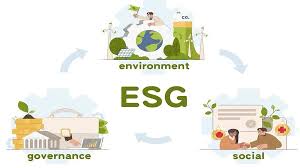ESG Oversight and the Challenge of Greenwashing in India

- 13 Aug 2025
Introduction
Environmental, Social, and Governance (ESG) practices are increasingly shaping corporate accountability and sustainable development worldwide. In India, where environmental degradation, social inequality, and governance failures remain pressing challenges, ESG assumes even greater significance. Recognising rising risks of greenwashing—the practice of making false or exaggerated sustainability claims—a Parliamentary Standing Committee on Finance has recently recommended the establishment of a dedicated ESG oversight body under the Ministry of Corporate Affairs (MCA).
Understanding ESG
- Environmental: Evaluates a company’s impact on the climate, energy use, waste management, and biodiversity.
- Social: Measures inclusivity, labour standards, community engagement, and equitable growth.
- Governance: Focuses on transparency, ethical decision-making, compliance, and protection of shareholder interests.
In India, ESG is critical because of:
- Climate vulnerability: India experienced 322 extreme weather days in 2024 (CSE), making sustainability practices urgent.
- Social concerns: Persistent poverty and inequality require businesses to prioritise inclusivity.
- Governance needs: Strong corporate ethics help attract investment and build long-term trust.
Key Recommendations of the Standing Committee
- ESG Oversight Authority: A specialised body under MCA to verify sustainability claims, detect fraud, and design sector-specific ESG guidelines.
- Strengthening Legal Mandate: Amendments to the Companies Act, 2013 to embed ESG responsibilities into directors’ duties, making sustainability a core element of business strategy.
- Support for MSMEs: Providing frameworks and guidance to help small enterprises adopt ESG without excessive compliance burden.
- Deterrence Measures: Faster penalties for false claims to curb greenwashing.
- Strengthening Institutions: Empowering SFIO and NFRA to detect financial crimes linked with ESG misreporting.
- CSR Transparency: Better monitoring to ensure Corporate Social Responsibility efforts are genuine and impactful.
India’s ESG Initiatives
- SEBI’s BRSR Framework: Mandates top 1,000 listed companies to disclose ESG performance, aligned with international norms like GRI and SASB.
- CSR Mandate (Companies Act, 2013): Encourages companies to invest in social and environmental causes.
- Green Rating Project (CSE): Rates industries on environmental performance.
The Challenge of Greenwashing
Greenwashing undermines ESG credibility by misleading consumers and investors. It often involves vague labels (“eco-friendly,” “natural”), token CSR activities, or misuse of traditional systems like Ayurveda to project sustainability without genuine practices.
Factors driving greenwashing in India
- Eco-consumerism: Rising demand for sustainable goods, especially among youth.
- Weak enforcement: Non-mandatory standards like BIS Eco-Mark limit accountability.
- Fragmented regulations: ESG rules spread across multiple agencies, creating compliance gaps.
- Cultural exploitation: Misuse of heritage-based terms for marketing.
- CSR marketing: Highlighting symbolic actions while continuing harmful operations.
Regulatory Safeguards
- Consumer Protection Act, 2019: Central Consumer Protection Authority can penalise misleading environmental claims.
- ASCI Guidelines: Ensure environmental claims in advertising are evidence-based.
- Plastic Waste Management Rules: Aim to regulate reduction claims, though gaps remain.
Conclusion
The rise of ESG reflects India’s journey towards balancing economic growth with sustainability and ethics. However, greenwashing threatens this transition, diluting genuine efforts. The Parliamentary Committee’s recommendation for a centralised ESG oversight authority is timely, offering a pathway to ensure accountability, strengthen investor confidence, and align India’s corporate governance with global sustainability standards.
For India, integrating ESG into the corporate ethos is not merely regulatory compliance—it is a strategic imperative for long-term resilience, social equity, and climate security.
